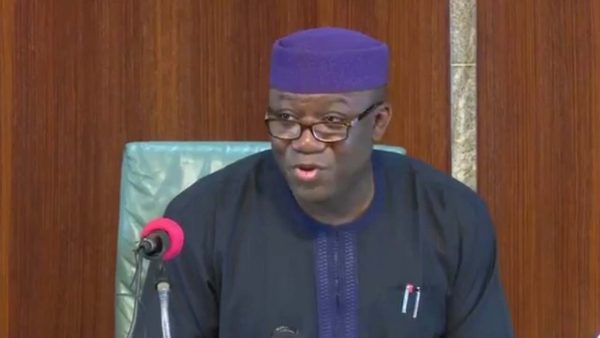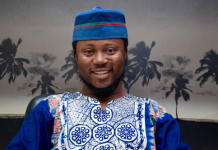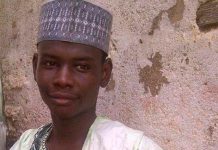Africa Press-Nigeria:
Governor Kayode Fayemi of Ekiti State and current chairman of the Nigeria governors Forum (NGF) speaks on the clamour for fiscal federalism, devolution of powers, activities of self-determination groups in the country, insecurity, among other knotty national issues in this interview with journalists. KUNLE ODEREMI brings part of it:
WHAT would you consider the gains, challenges and the constraints of governing Ekiti State in the last two years of your return to office?
I’m in a fairly unique position in the sense that I’m not a new kid on the block. So, I cannot be excused from lack of knowledge of the challenges of office. If you all recall what I said during the campaigns in 2018, I said I had unfinished business which was the reason I was returning to Ekiti, not that I didn’t have an alternative or I just wanted to be governor for its own sake. I was a minister at the time I chose to go back because of the circumstances of my exit from office. I wanted to ensure that we won the state back to complete many projects embarked on in my first term, as well as entrench an irreversible development trajectory. In the four years that I was out of office, there was widespread suffering and poverty in the state. Ekiti, many will still argue, is essentially a civil service state. Payment of workers’ salaries should not be considered as an achievement. However, when you are a civil service state and you are operating in a situation where people have not been paid for almost a year, then it becomes a big deal when you take that burden off those directly affected, not to mention the multiplier effect on the citizens of the state. It’s, therefore, clear that we needed a change of leadership in order to get good governance back on the agenda and a sense of purpose back to government.
You can recall, my campaign focused on restoring the values and reclaiming the land of Ekiti. What was to be reclaimed? Take the social intervention programmes that we had in the state when I was governor. They were all cancelled by my successor. There was no longer free education programme up to senior secondary level as we used to have in my first term. The monthly stipend for the elderly citizens, “OwoArugbo” and the Food Bank, “OunjeArugbo”, as we call it in Ekiti also disappeared.
The free health programme for the under-five, over-65, pregnant women and people with disability were also cancelled by the previous government. Now, all these are back in Ekiti and our people are enjoying them. Given our parlous financial state, we figured out a way to run an economy that has also generated more investments for the state. If you look at our agricultural sector, we decided, policy-wise, that the only way we could transit from being a subsistence agricultural state was to find a mechanism to attract more commercial investment to the agriculture sector in the state. We have brought such critical players to the agricutural sector like Terra Agric, Dangote Farms, Stallion Farms, FMS, Promise Point and Cowbell (Promasidor) to Ekiti and in another three months, Promasidor would have reached full-scale production of dairy products. This is something that has led to the revival and resuscitation of the Ikun Dairy Farm that has been moribund for over two decades. We are establishing a special agriculture processing zone supported by the African Development Bank (AfDB) and the World Bank. We are in partnership with the World Bank on rural access to farms to aid agric marketing process. Basically, what that does for us is to open up the state by fixing the feeder roads, linking the farms to the market. Roughly, 1,000km of rural roads in addition to other agricultural infrastructure have been done.
In terms of roads, one of the most critical roads people complained about is the Ado-Akure road. When you go on that road, you will know the problem we have with the so-called federal roads.
How did you go about funding of the projects?
One of the very first things I did on coming back was to secure support of the AfDB to fix the road. Then, we ran into a hitch with the Federal Government when they insisted that we should not fix their road, that they would fix the road themselves. So, the Governor of Ondo State and I had to approach the AfDB with the support of the minister, BabatundeFashola, to relocate the funds to the Federal Government. The road is now ready for construction and the contractor – Dantata and Sawoe – is mobilising to the site as I speak. We hope they will finish it in good time for the people to really benefit from it.
We have our legacy projects which, for me, are the ones that, over the long term, can be treated more as the gains of the state and the restoration of values I was talking about. Our knowledge zone, which is basically an aggregation of opportunity in the knowledge service industry, is a special economic zone, probably the first in the country that is focused on intellectual capital. This is informed by who we are as Ekiti people; it is what we are known for – our intellect, our passion for education. How do we turn this to wealth rather than just reading for the sake of getting degrees? That was what informed this special zone we created in our education quadrangle, where we have about four higher institutions feeding this zone in biomedical, health, agric technology, and information technology.
About a month ago, I was at the Nigerian Export Promoting Zone Authority (NEPZA) to discuss with them the granting of the status of a special economic zone for the sector. We are also working on an airport for the state, an agric cargo airport, which is something that, in the short term, appears a luxury in the state but over a long time, the economic trajectory will become more sensible to those who are accessing the state. We have the best hospital in Nigeria in Ekiti. The airport will also make the hospital accessible because of Ekiti’s landlocked nature. So, what you can see as challenges for us, of course, include resource constraints. Ekiti, as I said, is not exactly a buoyant state. If you look at the ladder of states, we have just N3.3 billion coming from the Federation Account monthly. When you earn N3 billion and you spend between N2.6 and 2.8 billion on recurrent expenditure, you have to be more creative in order to deliver on the promises you made to the people. We have been fortunate because we have international partnerships that we are benefiting from. So, we have been able to fill the gap a little bit. We have a comprehensive water programme that is supported by the European Union and the World Bank, for example. We used to have water from the tap in Ekiti up to the early 70s and then water disappeared. We have brought back all the dams, replaced all the pipelines and of course got to a point of commissioning the various water projects that would enable virtually all the local governments access to water. Similarly, our RAAMP projects in the rural areas are things we have done with the support of the French Development Agency (FDA) and the World Bank as well.
Challenges should not be the problem of anybody who is in public office. If you have thought through what you are doing and you are prepared for office, you are bound to have challenges, economically, politically because there are those who feel that the resources of the state should be shared. If you do not come from that school of thought, you are definitely going to run into challenges with some elements, who may see things differently. Again, that is the price you pay for leadership, and leadership is not just a title, not just about being called His Excellency; it’s what you do to affect the lives of people. You have to take your stand on some of these issues without any equivocation, even if it means you will run into some political qualms as a result.
What about the constraints?
Constraint, I think, is something that is worth reflecting on. I think we are fast getting to a point in which we must confront our reality as a federation. Finance is always a constraint at the state level. There is what I call the tyranny of unfunded mandates. We can’t continue to run an economy the way we are doing. We have to figure out a structure, a formula that will enable us generate more funds internally and at the same time ensure equitable and fair distribution of what’s available in the federation coffers. We need a formula that is more responsive to the yearnings of the population. The current structure obviously favours those who are more associated with the unitary structure that privileges concentration of powers and resources at the centre rather than a genuine federal structure of federation units that are more accountable to the people and responsive to the challenges that the people have. What that formula should be has been a subject of debate from all sides of Nigeria. Clearly, the federal structure we have now is problematic and it is not working as it should and there is a justification for more devolution of not just functions, unless you want to suffer from a tyranny of unfunded mandate but also resources. You can’t devolve functions and not support it with resources and that is what we are faced with now. Thankfully, the government is more responsive under President Buhari. Federal roads that had been fixed for the past 20 years and not one naira was paid by the governments of Presidents Olusegun Obasanjo, late Umaru Yar’Adua and Dr Goodluck Jonathan has now been paid by President Buhari. He asked the minister of works and housing, Babatunde Fashola, to go round the 36 states, check all the federal roads that have been fixed with evidence that they were actually fixed by the states and then pay. And he paid. That is not something that we have experienced since the dawn of this democratic dispensation.
Frankly, the issue is we still have to ask: What is a federal road? The people, who are plying the road in my state don’t know the difference between a federal road and a state road. All they will say is that ‘Mr Governor, you are not doing your job,’ only for you to start explaining that ‘it’s not my road and I need permission to even work on it,’ just as we have experienced trying to work on Ado- Akure road. It is the same story all over. These roads are bad; the Federal Government has no money to fix them. Some they will fix via Sukuk bonds; some via the Sovereign Wealth Fund. We don’t have the resources. So, we have to devise a very sustainable means of addressing these issues beyond what we do on a medium scale basis. The Federal Government can always borrow to cover any shortfall but sub-nationals cannot, except we go through the Federal Government. Wearing my other hat as the chairman of the Nigeria Governors’ Forum (NGF), this is an issue that has been on the front burner of our work. We hope Nigerians would be able to push the argument to a point where the resources and the powers that reside in Abuja can be devolved to the states, with the resources also devolved to solve the responsibilities carried out at that level. It may not automatically improve performance but I believe it would improve accountability by bringing government closer to the people.







